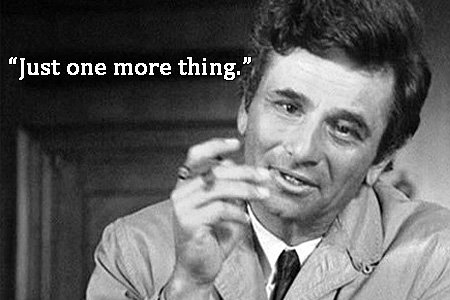
We talked about how the writer connects the word substance directly with the word evidence. We learned that substance is that which a thing consists of; it is real and it is factual. The evidence that God wants to present to the world is threefold.
• His work in Creation
• His work in human history
• His Work in the lives of His people
I love good mysteries; whether it is on old time radio, novels or movies. I love the challenge of following the evidence. More often than not I am correct guessing “who done it”. One of my all-time favorite shows is “Columbo”, starring Peter Falk.
The eponymous character is a homicide detective. However, this show is set in the “inverted detective story format”. The show begins with the commission of the crime. We are shown the perpetrator, their methodology and sometimes even their motives behind the offense. The tension of the show centers on the detective discovering the evidence. There is no “who done it” element. In other words for the viewing audience, there is no real mystery to solve. We are given the origin or “genesis “of how it all started in the beginning.
When it comes to the origin of the universe and of man, there is really no mystery. We are given the “who done it” in the first chapter of the Bible. And all throughout history the evidence is corroborated. While Columbo is a fictional character, there are true to life men and women who have examined the evidence.

The Evidence in Human History
Among the world’s religions, the Bible stands out as singularly unique. It does so in several ways. One such way is its formatting. The Bible is:
• A book of history
• A book of prophecies
• A book that claims a supernatural origin
This is important, because if any it’s recorded facts are inaccurate, it immediately discredits it as “the Word of God”.The credibility of the Scriptures is reliant upon evidence supporting these claims. If the historical facts are wrong, then it cannot be a book of supernatural origins. Prophecy in a sense is recording history before it happens. If the prophecies are proven to be false, then it cannot be a book of supernatural origin.
Dr. John Warwick Montgomery, lawyer, theologian, and philosopher says:
“The historic Christian claim differs qualitatively from the claims of all other world religions at the epistemological point: on the issue of testability.”[1] In other words, only Christianity stakes its claim to truthfulness on historical events open to critical investigation. And only this explains the number of conversions by skeptics throughout history.
Since the days of Luke, men have followed the evidence to determine if these things be true. Concerning the trustworthiness of the evidence is supported by “many infallible proofs.” (Acts 1:3); The Greek en pollois tekmariois is an expression which is defined in the lexicons as “decisive proof” and indicates the strongest type of legal evidence.[1]
Footnotes:
(1) Joseph Thayer, Thayer’s Greek English Lexicon of the New Testament (Grand Rapids, MI: Baker, 1982), p. 617; James Hope Moulton, George Milligan, The Vocabulary of the Greek Testament Illustrated from the Papyri and Other Non-Literary Sources (Grand Rapids, MI: Eerdmans, 1980), p. 628; Spiros Zodhiates, The Hebrew-Greek Key Study Bible (Grand Rapids, MI: Baker, 1985), p. 71; Kurt Aland, et. al., The Greek New Testament (New York: American Bible Society, 1968), p. 179.
Base Scripture is Hebrews 11:1
Now faith is the substance of things hoped for, the evidence of things not seen.
This post has received a 6.87 % upvote from @boomerang.
You got a 0.52% upvote from @minnowvotes courtesy of @artoftherhyme!